A long and colourful history of Britain could be written through her ships — HMS Victory, Horatio Nelson’s sailing war machine at the battle of Trafalgar; the Golden Hinde, in which Sir Francis Drake circumnavigated the globe; RMS Titanic, the biggest, finest liner on Earth until she hit that berg; HMS Hermes, the aircraft carrier on which the Falklands war depended. And now Bibby Stockholm, a triple-decker brick of a barge on which floats the UK government’s backlogged asylum policy. These vessels are symbols and products of their eras, and Bibby Stockholm tells a penetrating tale of the state of Britannia, her ports, her peoples and her political captaincy.
Like the Titanic, Bibby Stockholm is a Liverpool-registered ship. Chartered from Merseyside’s Bibby Line by Corporate Travel Management (CTM), a global “travel solutions” company, on behalf of the Home Office, she was being repaired, refitted and inspected by Atlantic and Peninsula (A&P) Ports in Falmouth, Cornwall, when I began getting to know her. Preparations were under way for her voyage to Portland in Dorset, where she is to accommodate her 500 asylum-seekers. Falmouth was happier to see her depart this week, its work done and billed, than Portland was to see her arrive.
“What are 500 single men going to do in Portland?” asked the tourist officer at Crabbers’ Wharf, near the docks that will be Bibby Stockholm’s new base.


Portland is a busy little island at the end of Chesil Beach, linked to the seaside town of Weymouth by a causeway. There is an excellent D-Day museum, a few churches, two prisons, a castle and some pubs.
“If it were me,” I remarked, remembering my young travelling days (the Bibby’s compulsory residents will be unattached men), “I would go on the pull.”
“On the pull or on the piss,” the officer muttered.
Mystification seems to follow Bibby Stockholm around but her stated purpose, and unstated aims, are simple. Since 2019, large numbers of refugees and migrants from countries in Africa, the Middle East and Asia have crossed the English Channel in small boats launched from France. The Bibby Stockholm is intended to house some of the 51,000 people that the government says are waiting for asylum decisions and living in hotels, at a cost it puts at more than £6mn a day.
While many asylum-seekers are indeed in hotels, others are in temporary accommodation, and others still in government facilities such as Napier barracks in Folkestone, and in asylum processing and removal centres. A High Court judge sharply criticised the conditions in which refugees and asylum-seekers were housed at Napier, with its “filthy” facilities, unsafe dormitories, significant fire risks and a “decrepit” isolation block. Nevertheless, Napier is still in use as a holding facility.
Bibby Stockholm is surely intended to be read as a sign that the government and home secretary Suella Braverman are taking action on this key election topic. The Court of Appeal’s recent ruling against Braverman’s plan to deport asylum-seekers to Rwanda puts much of the weight of the crisis on this unlovely ship, which looks like a faded stack of red and grey portable cabins.
She is supposed to be cheaper than the hotel option. Exactly how much, the government will not say, leaving others to supply estimates: in a recent report, two NGOs, Reclaim the Sea and One Life to Live, calculated that the Home Office may save £9.28 per person per day by housing people awaiting decisions on their asylum claims in this way.
She is also supposed to be less cushy, or less tabloid-cushy, than hotels. Cabin fever is real. I have travelled on ships for long periods and you are sometimes lucky, with a good vessel and good companions. But being stuck in a floating box for months or years can be as hard as prison. Imagine what happens if you have a bully aboard, or certain people do not get on — hostile cliques can quickly form. When I was at sea, a desperate man in this kind of situation stabbed two of his crewmates to death on one of our sister ships in the port of Buenos Aires.
Nevertheless, I was excited to see her for the first time, in dry dock in Falmouth, where she was worked on around the clock from May 9 by A&P’s welders, oilers, fitters, mechanics, engineers and riggers, and by joiners, carpenters, electricians and plumbers from Bell Interiors.
Bibby Stockholm was supposed to have left Falmouth by June, then by July. Having been towed out of dry dock on July 9, she needed another week’s work at the quayside before she left and was towed to Portland eight days later on July 17, arriving the following morning. The reason for this is that — along with protests and controversy that extended from street demonstrations in Falmouth and Portland all the way to condemnation from the Archbishop of Canterbury, who called for the barge plan to be suspended — Bibby Stockholm brought a host of hidden problems to the south coast and to her charterers: the Home Office and the UK taxpayer.
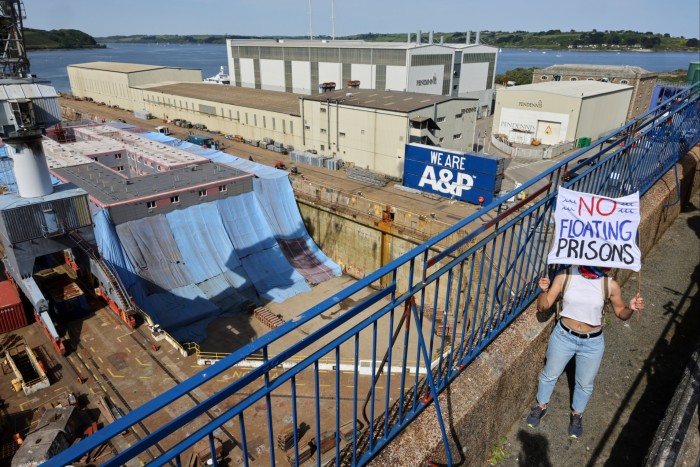



Although she is now tied up alongside a secure quay in Portland, and has no means of propulsion, Bibby Stockholm is a ship, with an International Maritime Organisation number. Subject to the laws of seas and harbours, her recent troubles began when she was inspected by A&P in Falmouth. A&P’s reputation rests on the seaworthiness and safety of the vessels that leave its docks — and the Falmouth port authorities and the Maritime and Coastguard Agency trust the company’s judgments.
“The word is that the rooms look nice but the hull was rotten,” said a manager at the Falmouth Hotel. Dock workers echoed this: a man who works in the dry docks told me that in places the steel hull had decayed to the point where it was dangerously thin, necessitating the replacement of entire sections. “That ain’t cheap.”
Bibby Line, CTM, A&P and the Home Office did not supply details of the repairs and their costs. But it seems clear that Bibby Stockholm was late out of Falmouth for good reasons, mostly age-related. Built in 1976, and having accommodated asylum seekers in Hamburg and Rotterdam, oil workers in Shetland and windfarm engineers in Piteå, Sweden, she was surely in need of some attention.
Bibby Stockholm has navigated outrage and controversy before. In 2008, when she was moored in Rotterdam as an asylum containment vessel, she became the focus of protests after the death on board of Rachid Abdelsalam, an Algerian man who suffered from heart problems. The NGO Statewatch raised questions over the standard of healthcare available to Abdelsalam and another man, Ahmad Mahmud El Sabah, an Egyptian who had died of diabetes and a liver infection on a second Rotterdam asylum barge, the Reno, though official reports concluded that staff on the boats had done nothing wrong.
While sections of the British media have remarked on photographs of Bibby Stockholm’s upgraded accommodation, quoting promises of “luxury living” from Bibby Marine’s prospectus, which predates her conversion to a UK government asylum solution, there are no pictures of what it will be like for two or more men to share a cabin, as would have to be the case for the 222-bedroom vessel to accommodate 500 men.
Asked to comment on the condition of Bibby Stockholm, CTM said that it had been cleared by Lloyds following inspection, that a full fire risk assessment had been undertaken and the vessel met all necessary requirements.
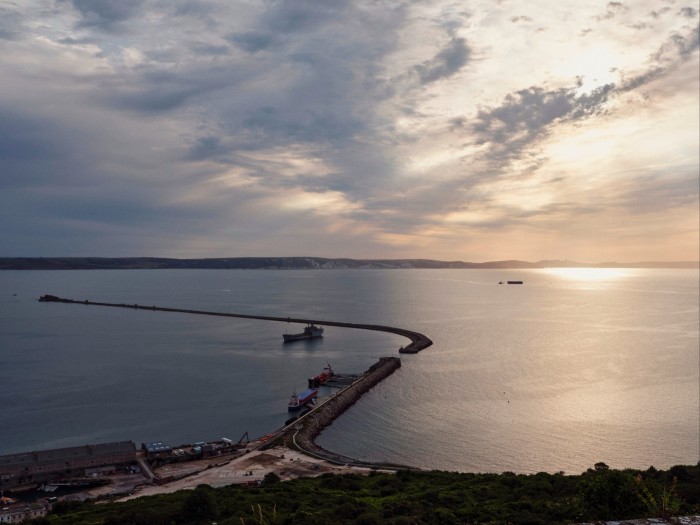

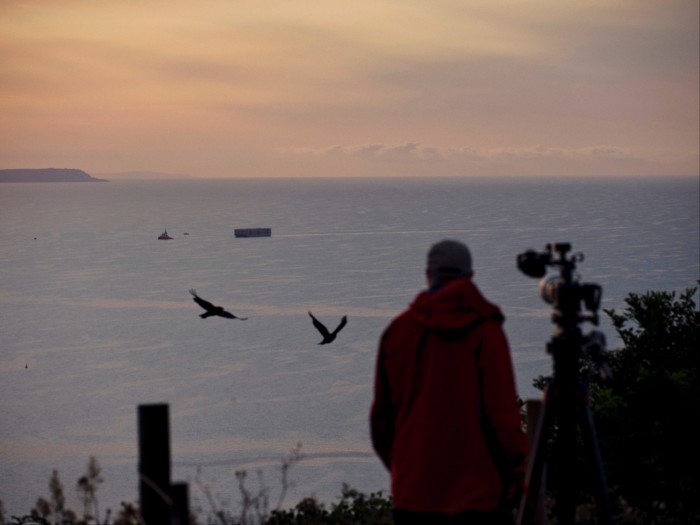

It did strike me as unfortunate that Bibby Stockholm will be in Portland rather than Falmouth. Falmouth is a miracle of a port, a seagirt treasure whose blue bays and green headlands shake hands with the Atlantic and the Western Approaches.
Local boatman Luke Arch took us out for a tour of the harbour in his inflatable, around the anchored tugs and warships. “I’m a sea-gypsy, in boats since I was four,” he said. Like many locals, he finds the working port, the busy harbour, the visitors who come by sea and land and the lively hospitality sector full of work and diversion. “They’re saying there’s going to be more boats like Bibby coming,” he said.
In Portland, the Conservative MP Richard Drax, Dorset Council and many residents have fiercely protested against the coming of Bibby Stockholm. But in Falmouth, though she sparked demonstrations against the mistreatment and incarceration of refugees, Bibby Stockholm and the fleet that may follow her represent work and money.
The hope in Falmouth is that A&P, an approved supplier to the Ministry of Defence as well as the Home Office, will be working on the barge’s sisters, if Prime Minister Rishi Sunak’s enthusiasm for them is maintained.
Sunak has committed to containment vessels, saying, “I don’t think it’s right that the British taxpayers are forking out £5.5mn a day to house illegal asylum seekers, that hotels in their communities are being taken over for this use. So barges are a solution to that and we will do as many as it takes.”
These vessels come floating out of a sinister offing of historical association and precedent. From 1776, about 70 decommissioned warships, stripped of their masts and rudders, floated or rested on mud around Britain’s harbours. Parliament initially approved the use of these monstrously dark, damp and unhealthy “prison hulks” for two years, but they became a significant part of the penal system, lasting until 1857.
It is hard to see how such associations could be accidental. For as real as she will be for those housed on her, Bibby Stockholm is also a symbol — a boat to “stop the boats”, word of which will travel back along the lines of refugees and migrants and put them off coming to Britain. Such symbolism would be congruent with the provisions of the new Illegal Migration Bill, passed by the Lords this week, which as its name suggests will criminalise people who arrive in small boats. More than 12,700 have made the crossing so far this year.
Refugee charities report that the asylum backlog is in fact comprised of individuals who are suffering extreme levels of stress and depression, leading to suicidality, isolation and despair. Meanwhile, sections of the British media and populace regard the hotel option as a pull-factor, drawing ever more people over the Channel.
As far as Portland is concerned, this rickety barge — the covering of her roof visibly worn and pooling, her reputation frankly sinister (“Bibby’s a cursed ship,” one Falmouth seafarer told me. “There were abusive incidents on her before”) and displaying worryingly few fire exits (we could only see three, all down the same side, unless you don’t mind a long jump and cold swim) — brings too small a purse ashore.
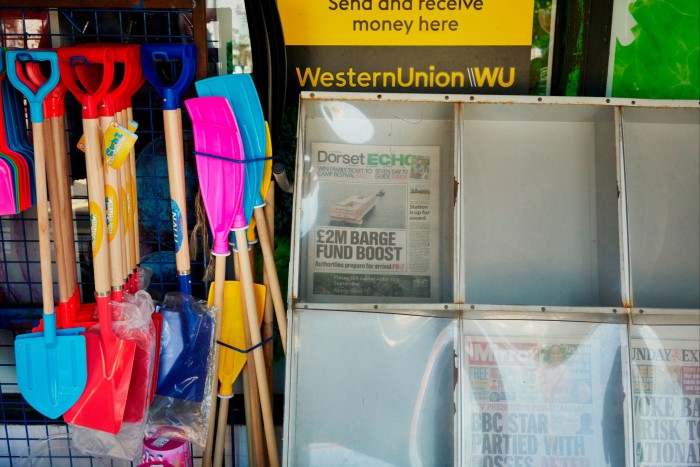

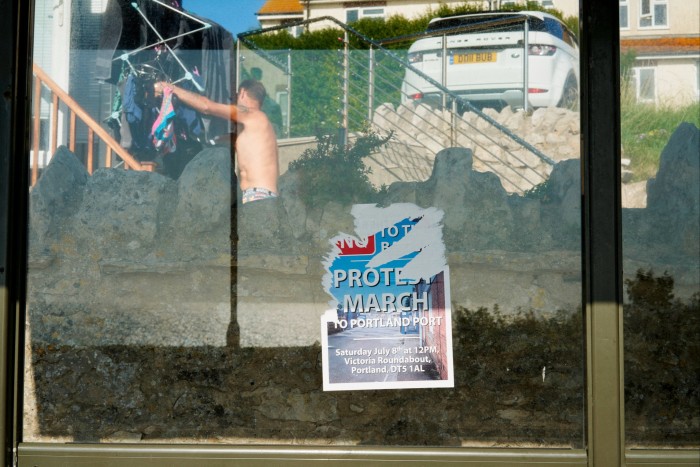

Dorset Council is working out how to spend £2mn of UK taxpayers’ cash from the government to best welcome the boys from the Bibby: more “community safety officers”, more extensive CCTV coverage and more CCTV operators covering longer shifts, it has decided, for starters.
I found two young men fishing for coins with magnets off the moles of Portland Castle in the small hours. They asked me if I had come off the Bibby, which was then still in Falmouth. I said I had not. What was Portland like, I asked.
“It’s OK, yeah,” said one, “As long as you’re not caught with the wrong people.”


I remarked on Portland’s heavy security presence, the police, the cameras, the discreet and pervasive military-maritime air. It starts with 19th-century cannons lying around, and the Mark VIII torpedo in the square, designed in Weymouth and used all over the world — most recently on the cruiser General Belgrano during the Falklands war, its plaque proclaims. It extends to the Navy helicopter hovering high overhead, surveying France and the Channel easily from that altitude, to the second world war gun emplacements, to the ultra-modern radars on the Verne hill, which survey all, and to the deep-water anchorage for nuclear submarines off Portland Bill.
“Well, there’s the prison and the young offenders’ prison,” said the second lad. “And they do live firing on Chesil Beach.”
Time will tell what awaits the first of the Bibby Stockholm’s compulsory mariners when finally they step ashore. Though free to come and go, they will depend on shuttle buses to get them in and out of the working port and will receive a phone call if out late at night. Dorset Council’s plans for them include language classes and volunteering opportunities.




Clare Moseley is the founder of the Care4Calais refugee charity, which she says is now in greater demand in Britain, helping those who have crossed the Channel, than it is in Calais among those waiting to cross. She sees cynicism in the government’s policy.
“The companies and businesses which are providing the containment and transport and accommodation on Home Office contracts are making fortunes,” she said. She suggested that more could be achieved by hiring visa-processing staff or clearing the backlog by country, as the UK did with Ukraine. “Being tough on asylum-seekers wins votes. We’ve had cases of people who are so desperate being stuck in hotels that they’ve tried to make it back to France the same way. People have died doing that, drowned.”
Looking down on Bibby Stockholm in her new home in Portland, one might think of her as the last in a line of great and historical experiments that have been conducted hereabouts. D-Day had never been tried before a massive force sailed from here and pulled it off: thousands of American soldiers and their vehicles left Portland for the fire and gore of Omaha Beach to fight and die and save the world. Nearby Chesil Beach is a historic naval firing range and torpedo-testing ground.
I would hate to be among Bibby Stockholm’s first residents, but for their sake I hope this latest experiment, accommodating asylum-seekers aboard her, works. I hope they are comfortable and safe, and that Portland’s residents’ fears about them and for them prove unfounded.


It still seems incongruous that all this should happen here. Falmouth and Portland show the best of maritime Britain — the mighty history, the stunning harbours, the skilful, inventive and industrious people of our ports and seas. If Falmouth is the lighter side, all sails and flags, then Portland is darker, with its weapons and watchers. Such is the sea history of Britain.
From Bibby Stockholm’s point of view this is a new chapter. I feel slightly sorry for her — her walk-on part in British maritime history is not exactly glorious. She is tucked away almost out of sight now, on her secure Portland dock, but you can gaze down on her from the garden of the Verne prison’s Jailhouse Café, which, along with radar scanners and firing positions, overlooks her. Far across the shining seas, similar accommodation vessels are used by the charity Mercy Ships as floating hospitals, providing healthcare to some of the world’s most deprived coasts. She might even join them one day. Only the fates and the British electorate can decide how Bibby Stockholm’s story unfolds from here.
Horatio Clare is the author of ‘Down to the Sea in Ships: Of Ageless Oceans and Modern Men’ (Penguin)
Find out about our latest stories first — follow @ftweekend on Twitter
Credit: Source link














